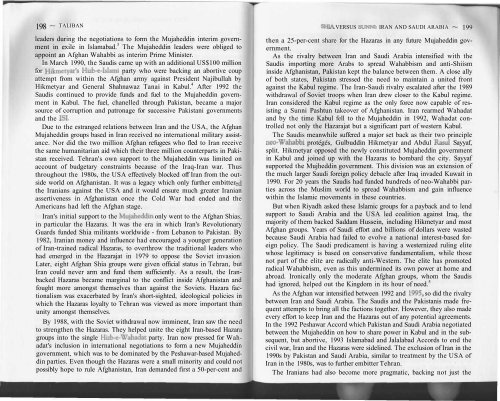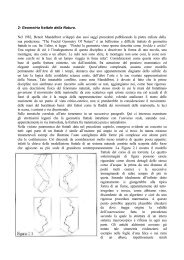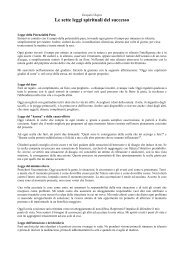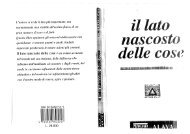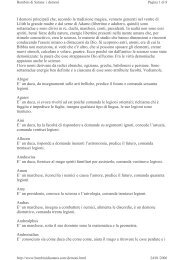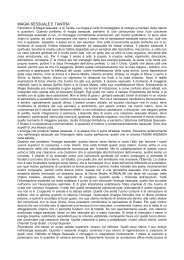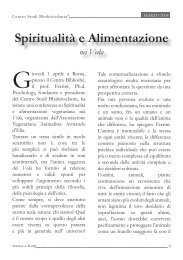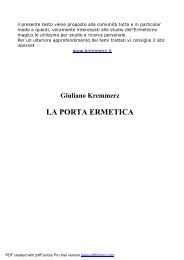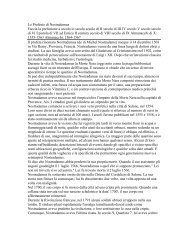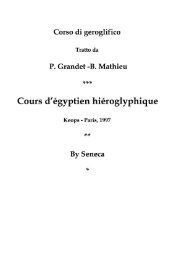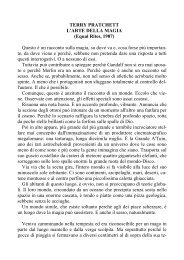SHIA VERSUS SUNNI: IRAN AND SAUDI ARABIA ~ 19715SHIA VERSUS SUNNI:IRAN ANDSAUDI ARABIAThere was a sense of change and renewal in Tehran in the spring of1999. For nearly 20 years since the Islamic revolution, Tehran'swomen had shrouded themselves in the dictated garb of hijab - theuniform black tents. Now suddenly the Ujab was sprouting faux-leopardskintrimmings and fur. Some women were wearing raincoats or donningthe hijab like a cape revealing short skirts, tight jeans, black silk stockingsand high heels. Rather than an imposed dress code, female modesty nowappeared to be up to the individual. The loosening up of the hijab wasonly one sign of the transformation of Iranian society after the electionof Saved Mohammed Khatami to the Presidency in May 1997, when hetook 70 per cent of the popular vote in a stunning victory against a morehardline conservative candidate. Khatami had garnered the votes of theyouth, who were fed up with 25-per-cent unemployment and high inflationand hopeful that he would usher in economic development and amore open society.Khatami's victory created an immediate thaw in Iran's relations withthe outside world as it opened up to the West, wooed its old enemy theUSA with the need for 'a dialogue between civilizations' and sought animprovement in relations with the Arab world. Afghanistan was tobecome the primary issue in helping thaw relations between Iran, theUSA and the Arab world. During his visit to Kabul in April 1998, USAmbassador Bill Richardson had already signalled that the USA saw Iranas a dialogue partner to help resolve the Afghan crisis. Iran was alsotalking to an old foe, Saudi Arabia.'The positive climate between Iran and Saudi Arabia is encouragingand both sides are ready to co-operate for the resolution of the conflictin Afghanistan,' Iran's new Foreign Minister Kamal Kharrazi said in May1998. 1 A suave, English-speaking diplomat who for 11 years had representedIran at the UN, Kharrazi's soft diplomatic manner and style wererepresentative of a revolution that had mellowed.Iran's new leaders were deeply antagonistic to the Taliban, but theywere pragmatic enough to realize that peace in Afghanistan was necessaryfor economic development and political liberalization in Iran. Stability intheir neighbourhood would also help Iran end its international isolation.Khatami was far from looking for a fight with the Taliban, yet just sixmonths later, after the Taliban killed nine Iranian diplomats in Mazar,Iran had mobilized a quarter of a million soldiers on its border withAfghanistan and was threatening to invade. As tensions with the Talibanescalated, the new relationship between Iran and Saudi Arabia took oneven more importance.Afghanistan has been just one area of conflict in the intense rivalrybetween the Persians and the Arabs. Both peoples have conquered andruled one another against a background of dispute between Sunni Arabiaand Shia Persia. In 1501 Shah Ismail of the Safavid dynasty turned Iraninto the first and only Shia state in the Islamic world. Both the Persiansand the Arabs had ruled over Central Asia and Afghanistan, althoughPersian rule and its culture and language was much more long-standingand left a permanent mark.In the twentieth century the long war between revolutionary Iran andIraq (1981-88), which led to some 1.5 million casualties, only deepenedthis rivalry as all the Arab states had supported Saddam Hussein's Iraq.As that war began, another was just beginning in Afghanistan and heretoo the age-old rivalries would continue - this time in the context of theCold War and the US aim to isolate Iran with the help of the Arab states.Ostensibly both Iran and Saudi Arabia were on the same side in theAfghan conflict. They strongly opposed the Soviet invasion of Afghanistan,supported the Mujaheddin and backed international measures to isolatethe Afghan regime and the Soviet Union. But they supported opposingfactions of the Mujaheddin and Iran never severed its diplomatic linkswith the Kabul regime. Saudi support to the Mujaheddin was in line withthe US and Pakistani strategy of providing the bulk of funds and weaponsto the most radical Sunni Pashtun groups and ignoring the Shia Afghans.The Saudis also separately funded Afghans who promoted Wahabbism.Dollar for dollar, Saudi aid matched the funds given to the Mujaheddinby the US. The Saudis gave nearly US$4 billion in official aid to theMujaheddin between 1980 and 1990, which did not include unofficial aidfrom Islamic charities, foundations, the private funds of Princes andmosque collections. 2 There were also direct funds given to the ISI, as in1989 when the Saudis handed over US$26 million dollars to bribe Afghan
198 TALIBAN SHIA VERSUS SUNNI: IRAN AND SAUDI ARABIA 199leaders during the negotiations to form the Mujaheddin interim governmentin exile in Islamabad. 3 The Mujaheddin leaders were obliged toappoint an Afghan Wahabbi as interim Prime Minister.In March 1990, the Saudis came up with an additional US$100 millionfor Hikmetyar's Hizb-e-Islami party who were backing an abortive coupattempt from within the Afghan army against President Najibullah byHikmetyar and General Shahnawaz Tanai in Kabul. 4 After 1992 theSaudis continued to provide funds and fuel to the Mujaheddin governmentin Kabul. The fuel, chanelled through Pakistan, became a majorsource of corruption and patronage for successive Pakistani governmentsand the ISI.Due to the estranged relations between Iran and the USA, the AfghanMujaheddin groups based in Iran received no international military assistance.Nor did the two million Afghan refugees who fled to Iran receivethe same humanitarian aid which their three million counterparts in Pakistanreceived. Tehran's own support to the Mujaheddin was limited onaccount of budgetary constraints because of the Iraq-Iran war. Thusthroughout the 1980s, the USA effectively blocked off Iran from the outsideworld on Afghanistan. It was a legacy which only further embitterthe Iranians against the USA and it would ensure much greater Iranianassertiveness in Afghanistan once the Cold War had ended and theAmericans had left the Afghan stage.Iran's initial support to the Mujaheddin only went to the Afghan Shias,in particular the Hazaras. It was the era in which Iran's RevolutionaryGuards funded Shia militants worldwide - from Lebanon to Pakistan. By1982, Iranian money and influence had encouraged a younger generationof Iran-trained radical Hazaras, to overthrow the traditional leaders whohad emerged in the Hazarajat in 1979 to oppose the Soviet invasion.Later, eight Afghan Shia groups were given official status in Tehran, butIran could never arm and fund them sufficiently. As a result, the IranbackedHazaras became marginal to the conflict inside Afghanistan andfought more amongst themselves than against the Soviets. Hazara factionalismwas exacerbated by Iran's short-sighted, ideological policies inwhich the Hazaras loyalty to Tehran was viewed as more important thanunity amongst themselves.By 1988, with the Soviet withdrawal now imminent, Iran saw the needto strengthen the Hazaras. They helped unite the eight Iran-based Hazaragroups into the single Hizb-e-Wahadat party. Iran now pressed for Wahadat'sinclusion in international negotiations to form a new Mujaheddingovernment, which was to be dominated by the Peshawar-based Mujaheddinparties. Even though the Hazaras were a small minority and could notpossibly hope to rule Afghanistan, Iran demanded first a 50-per-cent andthen a 25-per-cent share for the Hazaras in any future Mujaheddin government.As the rivalry between Iran and Saudi Arabia intensified with theSaudis importing more Arabs to spread Wahabbism and anti-Shiisminside Afghanistan, Pakistan kept the balance between them. A close allyof both states, Pakistan stressed the need to maintain a united frontagainst the Kabul regime. The Iran-Saudi rivalry escalated after the 1989withdrawal of Soviet troops when Iran drew closer to the Kabul regime.Iran considered the Kabul regime as the only force now capable of resistinga Sunni Pashtun takeover of Afghanistan. Iran rearmed Wahadatand by the time Kabul fell to the Mujaheddin in 1992, Wahadat controllednot only the Hazarajat but a significant part of western Kabul.The Saudis meanwhile suffered a major set back as their two principleneo-Wahabbi proteges, Gulbuddin Hikmetyar and Abdul Rasul Sayyaf,split. Hikmetyar opposed the newly constituted Mujaheddin governmentin Kabul and joined up with the Hazaras to bombard the city. Sayyafsupported the Mujheddin government. This division was an extension ofthe much larger Saudi foreign policy debacle after Iraq invaded Kuwait in1990. For 20 years the Saudis had funded hundreds of neo-Wahabbi partiesacross the Muslim world to spread Wahabbism and gain influencewithin the Islamic movements in these countries.But when Riyadh asked these Islamic groups for a payback and to lendsupport to Saudi Arabia and the USA led coalition against Iraq, themajority of them backed Saddam Hussein, including Hikmetyar and mostAfghan groups. Years of Saudi effort and billions of dollars were wastedbecause Saudi Arabia had failed to evolve a national interest-based foreignpolicy. The Saudi predicament is having a westernized ruling elitewhose legitimacy is based on conservative fundamentalism, while thosenot part of the elite are radically anti-Western. The elite has promotedradical Wahabbism, even as this undermined its own power at home andabroad. Ironically only the moderate Afghan groups, whom the Saudishad ignored, helped out the Kingdom in its hour of need. 5As the Afghan war intensified between 1992 and 1995, so did the rivalrybetween Iran and Saudi Arabia. The Saudis and the Pakistanis made frequentattempts to bring all the factions together. However, they also madeevery effort to keep Iran and the Hazaras out of any potential agreements.In the 1992 Peshawar Accord which Pakistan and Saudi Arabia negotiatedbetween the Mujaheddin on how to share power in Kabul and in the subsequent,but abortive, 1993 Islamabad and Jalalabad Accords to end thecivil war, Iran and the Hazaras were sidelined. The exclusion of Iran in the1990s by Pakistan and Saudi Arabia, similar to treatment by the USA ofIran in the 1980s, was to further embitter Tehran.The Iranians had also become more pragmatic, backing not just the
- Page 1 and 2:
YALE NOTA BENE"The broader storyher
- Page 3 and 4:
TalibanMilitant Islam,Oil and Funda
- Page 5 and 6:
Vi ~ CONTENTSChapter 8A Vanished Ge
- Page 7 and 8:
AFGHANISTAN•^ UZBEKISTAN J TAJIKI
- Page 9 and 10:
2 ~ TALIBANaccounts for some 40 per
- Page 11 and 12:
"6 ~ TALIBANgas riches of landlocke
- Page 13 and 14:
10 ~ TALIBANgious mix that was to m
- Page 15 and 16:
Part 1History of theTaliban Movemen
- Page 17 and 18:
18 ~ ISLAM OIL AND THE NEW GREAT GA
- Page 19 and 20:
22 ~ ISLAM OIL AND THE NEW GREAT GA
- Page 21 and 22:
26 ~ ISLAM OIL AND THE NEW GREAT GA
- Page 23 and 24:
30 ~ ISLAM OIL AND THE NEW GREAT GA
- Page 25 and 26:
34 TALIBANKabul- Hikmetyar had alli
- Page 27 and 28:
38 ~ TALIBANrHERAT 1995: GOD'S INVI
- Page 29 and 30:
42 ~ TALIBANdo manage to take Kabul
- Page 31 and 32:
J46 ~ TALIBANgreater weight to UN e
- Page 33 and 34:
50 ~ TALIBANas they hung from steel
- Page 35 and 36:
54 ~ TALIBANthey would help rearm t
- Page 37 and 38:
58 TALIBANGul Mohammed Pahlawan, Gh
- Page 39 and 40:
62 TALIBAN2,500 Taliban, who had re
- Page 41 and 42:
66 TALIBANshould throw all aid agen
- Page 43 and 44:
70 ~ TALIBANyears of battle and hel
- Page 45 and 46:
74 ~ TALIBANThousands of Hazaras we
- Page 47 and 48:
78 TALIBANhas become a plague,' sai
- Page 49 and 50:
NEW STYLE FUNDAMENTALISM OF THE TAL
- Page 51 and 52:
86 TALIBANsity students - Hikmetyar
- Page 53 and 54:
90 TALIBANSharia was heavily influe
- Page 55 and 56: 94 TALIBANinflamed the debate in th
- Page 57 and 58: 98 TALIBANizing factor of Islam, it
- Page 59 and 60: 102 TALIBANadministrations made the
- Page 61 and 62: 106 ~ TAUBANfrom working, but it no
- Page 63 and 64: TALIBANUniversity, she held down a
- Page 65 and 66: 114 TALIBAN A VANISHED GENDER 115Ta
- Page 67 and 68: 118 TALIBANUS$1,300 - a small fortu
- Page 69 and 70: 122 TALIBANper cent of the total Pa
- Page 71 and 72: 126 TALIBANequipment, no electricit
- Page 73 and 74: 130 ~ TALIBANfight with the Mujahed
- Page 75 and 76: 134TALIBANAugust 1996 noted that Bi
- Page 77 and 78: 138 ~ TALIBANwho were using the Kho
- Page 79 and 80: 11DICTATORS AND OILBARONS: THE TALI
- Page 81 and 82: 146 TALIBAN DICTATORS AND OIL BARON
- Page 83 and 84: 150 — TALIBANgrowth of beards and
- Page 85 and 86: 154TALIBAN1998 when international o
- Page 87 and 88: 158 ~ TALIBANaround Afghanistan? Af
- Page 89 and 90: 162 TALIBAN ROMANCING THE TALIBAN 1
- Page 91 and 92: 166 TALIBAN ROMANCING THE TALIBAN 1
- Page 93 and 94: ROMANCING THE TALIBAN 2: 1997-99 17
- Page 95 and 96: 174 — TALIBANnon-Russian pipeline
- Page 97 and 98: 178 — TALIBANROMANCING THE TALIBA
- Page 99 and 100: 182 ~ TALIBANApril 1999. 'The US ha
- Page 101 and 102: 186 ~ TALIBANters or the transport
- Page 103 and 104: 190 ~ TALIBANThis Wild West of free
- Page 105: 194 ~ TALIBANgovernance. Pakistani
- Page 109 and 110: 202 TALIBAN SHIA VERSUS SUNNI: IRAN
- Page 111 and 112: 206 — TALIBANin Afghanistan - to
- Page 113 and 114: 210 — TALIBANand antagonism. The
- Page 115 and 116: 214 ~ TALIBANdrawn since 1996 - a P
- Page 117 and 118: 218 ~ TALIBANated and severely puni
- Page 119 and 120: Origins of Members of the Taliban M
- Page 121 and 122: APPENDIX 3 ~ 227Appendix 3A CHRONOL
- Page 123 and 124: 230 ~ TALIBANgraves near Shebarghan
- Page 125 and 126: 234 ~ TALIBAN8 June. US FBI places
- Page 127 and 128: 238 ~ TALIBAN1995 January16 MarchAp
- Page 129 and 130: 242 ~ TALIBANJune21 August10 Septem
- Page 131 and 132: 246 ~ TALIBANDupree, Nancy Hatch, A
- Page 133 and 134: 250 ~ NOTESChapter 31 Interview wit
- Page 135 and 136: 254 ~ NOTESmuddin, Religious Police
- Page 137 and 138: 258 NOTES13. The Japanese company M
- Page 139 and 140: 262 ~ NOTES28. Waxman, Sharon, 'A c
- Page 141 and 142: Abbas, Mulla Mohammed 22,61,100Abda
- Page 143 and 144: INDEX - 270Hazaras (continued)burea
- Page 145 and 146: INDEX ~ 274nF»r\/FaliViar» milita
- Page 147: INDEX ~ 278Talibans (continued)Sunn


